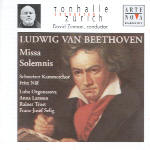This Missa solemnis seems to have clarity as its aim–a sharp, Boulez-like sound that strives to make every note audible. And David Zinman’s main mission appears to be to really bring out the organ. The opening measures of the Kyrie are almost shocking because of this–for a moment it hardly sounds like the Missa solemnis at all–but aisde from this temporary bump, it gives way to quite a good performance.
The singing is top-notch. When the chorus needs to be hair-raising, as in the “Gloria” or faster moments of the “Sanctus”, it is, without falling into top-of-the-lungs screaming. When the singers need to be a single quiet, reverent unit, they sound their best, as in the “Kyrie” or the slow portions of the “Credo”. The soloists are all excellent, and when the four of them sing as a quartet the blend is spot on. The result is an emmeshed, focused “mini-chorus” that really works, creating some of the best musical moments on this disc–a truly heartbreaking “Sanctus”, for example.
Although this isn’t the “hottest” or most breathless performance on disc, it’s a clear, intelligent reading, capable of reminding us of what makes this music so great. There are disappointing moments, such as in the “Benedictus” where the solo violin ought to sound warm but instead comes off as boxy and square. But the performance itself is not entirely to blame for this; it has more to do with the generally confined quality of the acoustic, which strips the music of its full depth and dynamic range. We hear the power of Zinman’s orchestra wanting to get out, but it is hardly allowed past the barrier of this recording’s sonic limitations.
































